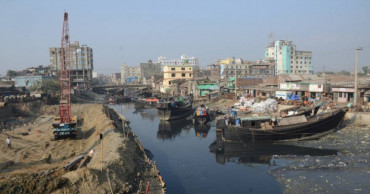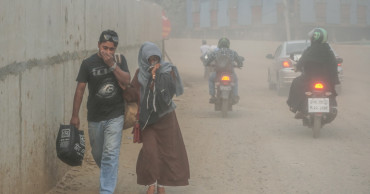Water pollution
Unregulated poultry farms push Feni into a growing environmental crisis
Unplanned, unregulated and unapproved poultry farms across Feni district are triggering severe environmental pollution, disrupting local biodiversity and putting thousands of residents at risk, according to locals and officials.
Residents have filed repeated complaints with government offices over the growing pollution caused by the mushrooming farms.
The district administration has responded with assurances of action, but meaningful intervention is yet to be seen.
According to data from the Department of Environment (DoE), Feni has 1,367 registered poultry farms, while another 1,814 have applied for environmental clearance.
Among these are 544 layer farms, 856 broiler farms, 384 Sonali farms, eight parent stock layer farms and 22 parent stock broiler farms.
However, the number of illegal and unapproved farms remains unknown. Officials estimate the actual figure to be more than double the number of registered farms.
A visit to several parts of Sonagazi upazila revealed poultry farms built haphazardly on rooftops, in residential yards, beside ponds, on croplands, along canals and directly next to roads.
Despite clear guidelines requiring clearance from the Livestock Department and compliance with structural standards, the vast majority of these farms have ignored the rules altogether.
During recent inspections, this correspondent found many farms operating without environmental clearance or Livestock Department licences, even though existing regulations require either DoE approval or registration with the Livestock Department before a farm can be established.
Because these farms have expanded outside the legal framework, environmental pollution has intensified across Sonagazi and other unions.
Read more: How Green Industries Can Reduce River Water Pollution in Dhaka City
The impact on local ecology is profound, while residents say their daily lives have become increasingly unbearable.
Agricultural lands are suffering extensive damage, with waste from an estimated 95% of the farms polluting water bodies and soil.
Dumped waste is contaminating canals, disrupting irrigation and creating shortages of clean water.
Although guidelines dictate that poultry farms must be located at least 200 metres from residential areas, many have been set up right beside homes, schools and mosques.
The foul odour makes nearby roads difficult to use, and locals report rising illness among residents and students of surrounding educational institutions.
Many residents say farm owners often wield local influence, making it difficult to protest. Those who raise concerns are reportedly harassed or threatened.
Farm waste has also reduced crop yields, while the constant stench makes it difficult for children and adults alike to move around the affected areas.
Mamtaz Begum, a 70-year-old resident of Char Elahi village under Motiganj Union, said she once lived peacefully.
But over the past four to five years, influential locals have set up layer farms near her home.
Waste from the farms has polluted ponds and croplands, while the smell, carried by the south wind, has worsened her breathing problems.
She fears she may eventually have to abandon her ancestral home.
Similar conditions prevail across Bogadana, Amirabad, Mongalkandi and Nawabpur unions, where unplanned and unapproved farms continue to proliferate without environmental clearance, livestock licences or even basic trade licences from the Union Parishad.
Residents say repeated complaints and even human-chain protests have failed to yield results, largely due to weak monitoring.
They demand strict action against the illegal farms.
With 100M birds dead, poultry industry could serve as example as dairy farmers confront bird flu
In Char Elahi village, a farm near the house of Mishu Soudagar was found just 15 yards from residential houses.
Between 40 and 50 households live within a 150-yard radius.
Waste is dumped into a small pit and nearby cropland, attracting flies and mosquitoes and producing an overpowering stench.
Dead chickens wrapped in plastic bags were also seen dumped in roadside drains and fields.
Kamal Hossain, a resident of the area, said locals must use the road beside the farm several times a day, enduring the unbearable odour.
Children face difficulties travelling to school, while mosquito infestations have escalated sharply.
Some farm owners, however, insist they are trying to comply. Ahsan Ullah of Bogadana Union said he started his farm to become self-reliant after returning from abroad.
Closing it now would cause severe financial loss, he said, adding that he has applied for clearance.
But nearby residents, including Pulak, Farida Begum, Khadija Begum and Abdul Shukur, said the farm’s waste has made life intolerable.
Strong hatchery, skilled workforce vital for sustainable growth of poultry sector
3 months ago
Fish production at risk due to water pollution, filling up of water bodies: Adviser Farida
Fisheries and Livestock Adviser Farida Akhter on Saturday said that due to the water pollution and filling up of water bodies, fish production is at risk.
"Unfortunately, our rivers have become polluted and the use of pesticides in agriculture has increased while the water bodies are being filled up. If this continues, fish populations will not survive," she said.
The adviser came up with the remark while speaking at the "Fisheries Entrepreneur Summit-2025", held at the Bangladesh-China Friendship Conference Center in the capital.
The summit aimed to promote innovation, sustainable development and the advancement of young entrepreneurs in Bangladesh’s fisheries sector.
She also stressed the need for coordinated effort from all authorities concerned of different ministries to ensure safe production of food for the future generation.
60% cancer patients directly involved in agriculture: Adviser Farida
Mentioning that turning fisheries into an industry will destroy its fundamental nature, the adviser said, "If fisheries are turned into an industry, their core nature will be lost. Internationally, we have seen the harmful effects of industrial food production, which can have significant impacts in various ways.”
Noting that the new generation is becoming more dependent on poultry than fish, Farida said, "We say that Bengalis thrive on rice and fish, but is our younger generation truly following this? They seem to be shifting towards rice and poultry instead. Many of them are unwilling to eat meals without eggs or meat. We need to encourage the new generation to eat more fish."
She further emphasised the importance of introducing small fish to children's diets. "Children must be taught to eat fish with bones. Efforts should be made to increase the popularity of fish," she added.
Human rights organisations often overlook workers' rights: Farida Akhter
1 year ago
How Green Industries Can Reduce River Water Pollution in Dhaka City
Dhaka City has been suffering from significant challenges related to river pollution. The rivers encircling Dhaka—namely the Buriganga, Turag, Shitalakkhya, Balu, Tongi Canal, and Dhaleswari—are experiencing severe pollution, which has escalated alarmingly in recent years.
Industrial waste is one of the primary contributors to this pollution. The degradation of these rivers' water quality has reached a point where it poses significant challenges to water treatment facilities. The Sayedabad Water Treatment Plant, which relies on the Shitalakkhya River, faces difficulties in treating water due to excessive pollution, especially during the dry season. Approximately 1.5 million cubic meters of waste are dumped into Dhaka's surrounding rivers daily, with industrial sources accounting for about 80% of this pollution.
Climate-resilient green industries present a promising pathway to combat the river pollution issue. By integrating sustainable practices and technologies, these industries can reduce water pollution and promote the efficient use of resources.
Read more: Can Green Buildings in Bangladesh Create Opportunities for Carbon Trading?
How Industries Cause River Pollution in Dhaka City
Industries are one of the biggest contributors to river pollution in Dhaka. The pollution primarily comes from textile, dyeing, tanneries, pharmaceuticals, and chemical industries that discharge untreated or poorly treated wastewater into rivers. Here’s how industries are causing severe pollution in Dhaka’s rivers:
Direct Discharge of Industrial Wastewater
Many industries in Dhaka, especially in areas like Savar, Gazipur, Narayanganj, and Keraniganj, discharge toxic chemicals, heavy metals, and untreated wastewater directly into rivers. These wastes include dyes, acids, alkalis, and heavy metals (lead, chromium, arsenic, and cadmium) that degrade water quality and harm aquatic life.
Textile and Dyeing Industry Pollution
The textile and dyeing industries in Dhaka (particularly in Narayanganj and Gazipur) use large amounts of water and produce chemical-laden effluents. These wastes contain synthetic dyes, bleaching agents, and salts, making river water toxic and depleting oxygen levels.
Read more: Top 3 Books in English on the Bangladesh Sundarbans
Tanneries in Hazaribagh and Savar
The leather industry, previously concentrated in Hazaribagh, was relocated to Savar Tannery Estate to reduce pollution. However, the central effluent treatment plant (CETP) in Savar is not fully functional. As a result, untreated tannery waste containing chromium, sulfides, and acids still pollutes the Dhaleshwari River, turning it black and lifeless.
Pharmaceutical and Chemical Industry Waste
Factories producing medicines, pesticides, and plastics release toxic organic compounds into rivers like the Turag and Shitalakkhya. These chemicals can cause long-term health hazards for people using river water.
Lack of Proper Wastewater Treatment
Many industries do not have Effluent Treatment Plants (ETPs), or they bypass them to save costs. Even when ETPs are installed, they often operate below capacity or remain inactive due to poor enforcement of environmental laws.
Contribution to Heavy Metal Contamination
Heavy metal contamination is another critical concern. A comprehensive study published in July 2024 highlighted alarming levels of heavy metals—such as arsenic, lead, cadmium, chromium, iron, and manganese—in Bangladesh's rivers over the past two decades.
Read more: What is Carbon Trading? How does it work?
The Buriganga River was identified as the most polluted, with contamination levels exceeding acceptable limits during all three seasons, posing severe threats to aquatic life and public health.
Impact on Aquatic Life and Public Health
Industrial pollution has drastically reduced fish populations in Dhaka’s rivers. Contaminated river water enters the food chain, affecting humans through the consumption of fish and polluted water. People living near polluted rivers suffer from skin diseases, respiratory issues, and gastrointestinal disorders.
1 year ago
What is Carbon Trading? How does it work?
Carbon emissions, primarily in the form of carbon dioxide (CO₂) and methane (CH₄), contribute to global warming, climate change, and sea-level rising which in turn increase the frequency and intensity of natural phenomena, and disasters like cyclones, floods, wildfire, drought, heatwave, etc. Reduction of carbon emissions has multifarious environmental, economic, social, and health benefits. Carbon trading is both a benefit and a mechanism for reducing carbon emissions. Here’s how it works and why it can be beneficial.
What is Carbon Trading
Carbon trading, also known as carbon emissions trading, is a market-based approach to reducing greenhouse gas (GHG) emissions. It allows countries, companies, or organizations to buy and sell permits that represent the right to emit a certain amount of carbon dioxide or other greenhouse gases. By putting a price on carbon emissions, it incentivizes participants to lower their emissions and invest in cleaner technologies.
Carbon emissions trading operates under a cap-and-trade system where governments or organizations set a limit (cap) on total emissions. Companies receive or buy carbon credits, which allow them to emit a certain amount of CO₂. If a company emits less than its allowance, it can sell its excess credits to others. If a company exceeds its limit, it must buy more credits or face penalties.
Carbon trading is a benefit of reducing emissions because it creates financial incentives for businesses to go green. However, it works best when proper regulations and transparency ensure that actual emission reductions occur.
Read more: Plastic Pollution: Harmful effects on human health and environment
What Is the Process of Carbon Credit Sale?
The process of selling carbon credits involves several steps, from generating the credits to finding buyers and completing the transaction. Here’s a step-by-step breakdown:
Carbon Credit Generation
A company or project must first reduce or remove greenhouse gas (GHG) emissions through activities like reforestation, renewable energy projects, or carbon capture. The emission reduction must be measured, verified, and certified by an independent third party.
Verification & Certification
The project must be validated by recognized carbon standards such as: Verified Carbon Standard (VCS), Gold Standard, Clean Development Mechanism (CDM), Climate Action Reserve (CAR), etc. These standards ensure that each credit represents one metric ton of CO₂ reduced or removed.
Registration on a Carbon Registry
Verified carbon credits are registered on platforms like: Verra, American Carbon Registry (ACR), Gold Standard Registry, etc. Each credit receives a unique serial number to prevent double counting.
Read more: How Can One Person Reduce Environmental Pollution?
Finding Buyers
There are two main types of carbon markets:
Compliance or Regulated Markets are created by government regulations to limit carbon emissions. Companies must buy carbon credits if they exceed their allowed emissions cap.
In the Cap-and-Trade system, governments set a maximum emission limit (cap). Companies emitting less than their limit can sell excess credits to others exceeding their cap.
Some countries impose a carbon tax, but companies can reduce their tax burden by purchasing credits.
Major Compliance Markets include the European Union Emissions Trading System (EU ETS), California Cap-and-Trade Program, China’s National ETS, Regional Greenhouse Gas Initiative (RGGI), etc.
In the Voluntary Carbon Markets (VCM) markets, companies and individuals buy carbon credits voluntarily to offset their emissions. These credits come from projects that remove or reduce CO₂ emissions, such as reforestation, renewable energy, and carbon capture.
Read more: Effects of Air Pollution on Unborn Children, Neonates, Infants
1 year ago
How Can One Person Reduce Environmental Pollution?
How can an individual take steps to prevent pollution? This question may seem simple, but it’s actually a big challenge that many people and nations around the world are trying to solve. According to the World Health Organization, pollution is a major cause of death worldwide. According to research, different kinds of pollution, such as air, water, soil, sound pollution, etc., are responsible for about 40% of the deaths around the world. According to WHO, household air pollution and ambient air pollution cause 7 million premature deaths annually worldwide. As the number of people living in cities increases, so does the amount of pollution. So, one should take proper steps to fight pollution.
Why Is It Necessary to Fight against Pollution at an Individual Level?
When we think of pollution, we usually think of things that are released into the environment by large organisations or governments. However, some pollution is also caused by individuals. Pollution at the individual level can greatly impact the environment and public health.
Pollution at the individual level comes from a variety of sources such as vehicles, factories, and homes. Polluting activities can release harmful chemicals into the air, water, and soil. These pollutants can cause a wide range of problems, including acid rain, air pollution, and water contamination. So, it is necessary to stop pollution at the individual level to save the world.
Read Mass Bathing in Buriganga Sunday demanding pollution-free river
There are many ways people can fight against pollution from an individual level. We can use our voices to speak out against polluting companies, we can reduce pollution levels individually, we can work to create policies that reduce pollution, or we can use our money to support organisations that work to protect the environment.
Ways One Person Reduce Air, Water, and Sound Pollution
Pollution has been a huge issue for decades and is still going strong. Whether it be in the form of chemical warfare, nuclear fallout, toxic waste runoff, or acid rain, the list of harmful pollutants goes on and on.
While some causes are unavoidable (natural disasters like volcanoes and hurricanes), there are many things we can do to help lower the amount of pollution that comes from individual sources, such as our homes.
Read Solution to pollution: Sprinkling water on Dhaka's roads & construction sites?
3 years ago
Global pollution kills 9 million people a year, study finds
A new study blames pollution of all types for 9 million deaths a year globally, with the death toll attributed to dirty air from cars, trucks and industry rising 55% since 2000.
That increase is offset by fewer pollution deaths from primitive indoor stoves and water contaminated with human and animal waste, so overall pollution deaths in 2019 are about the same as 2015.
The United States is the only fully industrialized country in the top 10 nations for total pollution deaths, ranking 7th with 142,883 deaths blamed on pollution in 2019, sandwiched between Bangladesh and Ethiopia, according to a new study in the journal The Lancet Planetary Health. Tuesday’s pre-pandemic study is based on calculations derived from the Global Burden of Disease database and the Institute for Health Metrics and Evaluation in Seattle. India and China lead the world in pollution deaths with nearly 2.4 million and almost 2.2 million deaths a year, but the two nations also have the world’s largest populations.
When deaths are put on a per population rate, the United States ranks 31st from the bottom at 43.6 pollution deaths per 100,000. Chad and the Central African Republic rank the highest with rates about 300 pollution deaths per 100,000, more than half of them due to tainted water, while Brunei, Qatar and Iceland have the lowest pollution death rates ranging from 15 to 23. The global average is 117 pollution deaths per 100,000 people.
Pollution kills about the same number of people a year around the world as cigarette smoking and second-hand smoke combined, the study said.
“9 million deaths is a lot of deaths,” said Philip Landrigan, director of the Global Public Health Program and Global Pollution Observatory at Boston College.
Read: Brick kilns threaten environment & cause health hazards in south-western Bangladesh
“The bad news is that it’s not decreasing,” Landrigan said. “We’re making gains in the easy stuff and we’re seeing the more difficult stuff, which is the ambient (outdoor industrial) air pollution and the chemical pollution, still going up.”
It doesn’t have to be this way, researchers said.
“They are preventable deaths. Each and every one of them is a death that is unnecessary,” said Dr. Lynn Goldman, dean of the George Washington University School of Public Health, who wasn’t part of the study. She said the calculations made sense and if anything. was so conservative about what it attributed to pollution, that the real death toll is likely higher.
The certificates for these deaths don’t say pollution. They list heart disease, stroke, lung cancer, other lung issues and diabetes that are “tightly correlated” with pollution by numerous epidemiological studies, Landrigan said. To then put these together with actual deaths, researchers look at the number of deaths by cause, exposure to pollution weighted for various factors, and then complicated exposure response calculations derived by large epidemiological studies based on thousands of people over decades of study, he said. It’s the same way scientists can say cigarettes cause cancer and heart disease deaths.
“That cannon of information constitutes causality,” Landrigan said. “That’s how we do it.”
Five outside experts in public health and air pollution, including Goldman, told The Associated Press the study follows mainstream scientific thought. Dr. Renee Salas, an emergency room doctor and Harvard professor who wasn’t part of the study, said “the American Heart Association determined over a decade ago that exposure to (tiny pollution particles) like that generated from the burning of fossil fuels is causal for heart disease and death.”
3 years ago
WB provides $170mn for better sanitation in Dhaka
The World Bank has approved $170 million to improve sanitation services in Dhaka city benefiting around 1.5 million people.
5 years ago
Treatment plants to be installed to check Buriganga water pollution
State Minister for Shipping Khalid Mahmud Chowdhury on Wednesday said treatment plants will be installed at the threshold of drainages to check water pollution of Buriganga River.
5 years ago
Buriganga Pollution: Contempt rule issued against Wasa MD
The High Court on Thursday issued a contempt of court rule against Dhaka Wasa Managing Director Taskim A Khan.
6 years ago
It’s time to declare Dhaka as ecologically critical area: HC
The High Court on Wednesday observed that time has come to declare Bangladesh’s capital Dhaka as an ecologically critical area due to widespread pollution.
6 years ago






.jpg)











